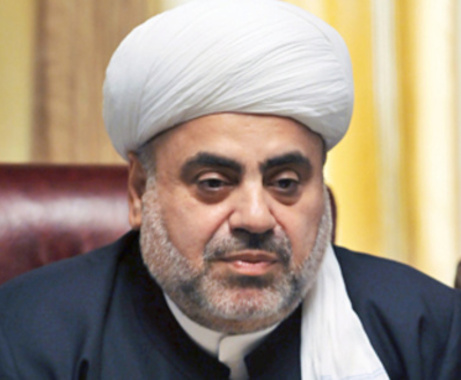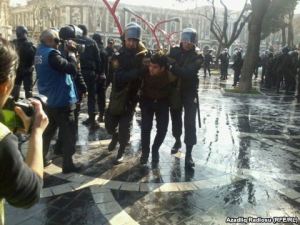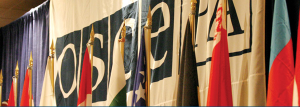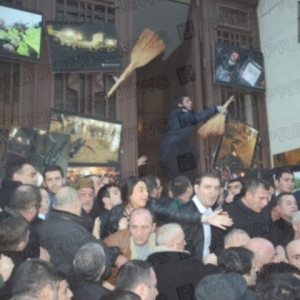
Sheikhulisam Allahsukur Pashazade
There was considerable astonishment in political circles in Azerbaijan and beyond at a statement issued ahead of the 9 October presidential Elections by representatives of Azerbaijan religious communities, who were gathered together by the senior Muslim Cleric in Azerbaijan, the Chairman of the Board of Caucasian Muslims, Sheikhulislam Allahshukur Pashazade. In the statement the religious leaders called on their people to vote for the incumbent president, Ilham Aliev.
The Azerbaijani news Agency, APA reported on 19 September that “the statement says that despite the separation of religion and state, true believers should not be separated from the motherland: “Believers have begun to live properly after Heydar Aliyev returned to power. Heydar Aliyev felt the essence of Islam and appreciated its role in improving the moral of the people. President Ilham Aliyev is currently continuing the successful path of Heydar Aliyev and has been able to achieve the believers’ sympathy. Muslims, Jews and Christians in Azerbaijan always feel the state care. Ilham Aliyev regards religious tolerance as the biggest boon. As believers, we thank Ilham Aliyev for his care for the believers during his 10-year presidency. We call on our people to vote for Ilham Aliyev in the upcoming presidential elections”.
In many countries interference by religious leaders in elections is illegal, and only in countries like Iran do the clergy play a direct part in politics. Azerbaijani politicians, both pro-government and pro-opposition, often boast about Azerbaijan being a secular republic and such blatant interference, if indeed the statement is accurate, will raise a lot of questions and offer a dangerous precedent. It is also not clear to what extent leaders of other religious denominations acquiesced with the statement.
source CEW with APA

 The case of Azerbaijani political activist Ilgar Mammedov is fast becoming a test-case of the resilience and integrity of those European institutions that are meant to be the guardians of human rights on the continent. Mammedov was arrested earlier this year after visiting the town of Ismaili at a time when rioting was taking place. Mammedov is accused of inciting the riot.
The case of Azerbaijani political activist Ilgar Mammedov is fast becoming a test-case of the resilience and integrity of those European institutions that are meant to be the guardians of human rights on the continent. Mammedov was arrested earlier this year after visiting the town of Ismaili at a time when rioting was taking place. Mammedov is accused of inciting the riot.

 Georgian civil society organisations had tough words for politicians following incidents at a protest in front of the National Library where President Saakashvili was due to speak. The International Society for Fair Elections and Democracy, Transparency International – Georgia, Georgian Young Lawyers’ Association and the Open Society – Georgia Foundation condemned the acts of violence that ensued. In their statement the four NGOs said
Georgian civil society organisations had tough words for politicians following incidents at a protest in front of the National Library where President Saakashvili was due to speak. The International Society for Fair Elections and Democracy, Transparency International – Georgia, Georgian Young Lawyers’ Association and the Open Society – Georgia Foundation condemned the acts of violence that ensued. In their statement the four NGOs said